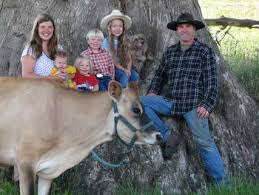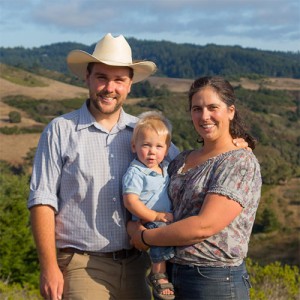If this were a normal year, the pastures of Pescadero would be clover-green and the grass would be ten inches tall. Erik and Doniga Markegard, of Markegard Family Grass-Fed, would be moving their stately Belted Galloways in a feeding rotation over 3,500 acres of prime munching grounds. Everywhere they roamed, the cattle would encounter thirst-quenching ponds and reservoirs with enough water to last through the summer.

The Markegard Family
That’s what would happen in a normal year. But this has been anything but a normal year. California is reeling from a drought so severe it has no precedent in the state’s recorded history, and two separate storms in February did not solve the problem.
On the South Coast, many pastures are covered with twisted, dry straw. The ponds and reservoirs are mostly empty. In an area whose economy so profoundly depends on a healthy farm sector, all the talk in town is about the drought. Anxiety is high, and morale is low.
“It’s been pretty scary and it still is,” says Doniga Markegard. “We’ve been having to bring in a lot of purchased feed, which is setting us back in our trajectory of growth. And we’re not in a position where we are willing to sell off our herd because of the investment we’ve put into it.”
In short, the Markegards are trying to cope with the new normal: drought conditions that carry over from year to year.
They are paying close attention to all their animals, monitoring muscle density and vitamin intake. They bought a water truck for their younger animals. Now they’re looking to move part of their herd to Sonoma for the rest of the season, which received heavier rainfall than the Bay Area.
Statewide, the drought has already compelled a lot of ranchers to sell their cattle because they can’t afford to keep them anymore. Farmers are looking at heavy sacrifices, too: This year, they are expected to idle more than 500,000 acres of cropland. If they do, it would deal an $11 billion body blow to the state economy. Meanwhile, parts of the Central Valley are literally collapsing as underground aquifers sag from over-pumping.
Here in San Mateo County, which produced $140 million worth of crops in 2012, the story is the same.
“It’s to the crisis point, really. Unless we have an extremely wet spring were going to be in a world of hurt,” says Bill Gass, Executive Director of the San Mateo County Farm Bureau. Farmers are looking at 30 percent cutbacks in planted acreage, he says. Hay is so expensive that ranchers are poised to sell their cattle, if they haven’t already.
Most of the water used in agriculture on the San Mateo County Coast comes from mountain streams and groundwater: two sources that depend entirely on rainfall.
“On average they’re saying we need something like 21 more inches of rain this season to get over the hump,” adds Gass. “That’s a pretty big number.”
Livelihoods on the line
A 30 percent cutback doesn’t just mean less value for farmers. It also means fewer jobs.
There’s nervous talk in town about what will happen to the hundreds of South Coast farm workers – and their families – who utterly depend on a thriving farm and nursery sector. They are not seasonal workers or recent immigrants. They are permanent members of the community. And it’s not just farm jobs that are at stake: the families send their children to the La Honda-Pescadero School District, which would collapse without them.
Puente is committed to seeing families through a tough year, but it will be a challenge, says Executive Director Kerry Lobel.
“It’s going to put a big press on our safety net services and will have to use private dollars to cover costs for rent, utilities and food assistance – because a lot of people are not covered by public services,” says Lobel.
In a part of the world where water is money, a serious drought induces its own trickle-down effects. In the previous drought that lasted from 2007 to 2009, 6,000 Central Valley farm workers lost their jobs. In Mendota, a farm town the size of Half Moon Bay, unemployment levels reached 40 percent.
President Obama recently announced an aid package that includes $60 million for food banks in drought-stricken towns, but it’s unlikely that money will reach Pescadero.
Gass says local farmers badly want to avoid resorting to layoffs.
“A lot of these guys have been working for the same farmers for 25, 30 years. A lot of the farmers feel they’re a part of their family. There’s a real sense of responsibility there. They don’t want to do anything if they can avoid it.”
A ‘wake-up call’
While some people pray for rain, others are planning for more droughts. Scientists have raised the possibility that the current climate is not an aberration, but a sign of things to come. The 20th century was unusually wet and mild in the context of the past several millennia. And the state’s growth trajectory has relied on the assumption that nothing would change.
But things have already changed, and experts say this is a “bellwether” moment for policymakers to rethink their water allocation and planning priorities for a much drier century ahead.
Doniga Markegard doesn’t need convincing.
“We’ve been working hard to prepare for when drought comes. This is kind of a wake-up call.”
The Markegards lease much of their grazing lands from land trusts and private owners. Even before this particular drought, the couple started talking about ways to “drought-proof” the land – which entails new, efficient ways to capture rainwater. But those initiatives will take money, and time.
“We need to make drought-proofing an agricultural priority, and it shouldn’t just be on the shoulders of the agricultural producer. We all have to eat. We’re all in this together,” she says.

The Watt Family
Kevin Watt agrees. He and his wife, ShaeLynn, own Early Bird Ranch in Pescadero. They sell pastured eggs and grass-fed, free-range chicken, pork and rabbit. After years of paying themselves a minimum wage and putting the rest of their revenues into growing their business, this was the year the Watts were poised to be a little more generous with themselves. Instead, the drought induced them to avoid buying new chicks this winter as they normally would. There’s not enough grassland to feed them.
This was also the year they learned just how resilient they could be – and the true meaning of ‘community.’
“Our customers will wait for us, which is incredibly comforting,” says Watt. In the meantime, the loss of income has prompted them both to look for temporary jobs off site.
Early Bird Ranch, like Markegard Family Grass-Fed, is looking at ways to capture rainwater in future seasons.
“Our business is based off working with reality on the ground,” says Watt. “This is a setback for this year, or maybe two years. But being a sustainable farm means being able to survive though the shocks that will naturally come.”






